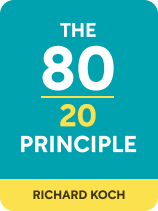

This article is an excerpt from the Shortform book guide to "The 80/20 Principle" by Richard Koch. Shortform has the world's best summaries and analyses of books you should be reading.
Like this article? Sign up for a free trial here .
What is the 80/20 principle? Why do some people and organizations enjoy massive success and wealth while the rest don’t?
Although our lives tend to be increasingly busy and complex, only a small fraction of the actions we take—and the people we interact with—contribute to our joy and success. According to Richard Koch, we can all take advantage of this 80/20 principle to multiply our happiness and success by focusing our time and energy on the few things in our lives that really matter.
Here’s how applying the 80/20 Principle can help you take your life to a whole next level.
What Is the 80/20 Principle?
What is the 80/20 Principle? The 80/20 Principle dictates that 80% of outputs stem from 20% of inputs. This unbalanced relationship, Koch says, shows up in various areas of life. For example, in any given company, we can reliably predict that 20% of products account for 80% of profits, 20% of customers account for 80% of sales revenue, and 20% of employees account for 80% of results. Similarly, in our personal lives, we owe roughly 80% of our achievements to 20% of the time we invest, 80% of our happiness to 20% of our life experiences, and 80% of the value we derive from relationships to 20% of the people in our lives.
(Shortform note: Koch credits the discovery of the 80/20 relationship between inputs and outputs to Italian economist Vilfredo Pareto. According to Koch, Pareto studied wealth concentration among people in 19th-century England and discovered that a minority of people held the majority of wealth. Many people have commented on Pareto’s discovery using many different terms. For example, in Eat That Frog!, Brian Tracy refers to the “80/20 rule.” Similar to Koch, Tracy says we should complete the most important task (the biggest frog) first. Also, in The One Thing, Gary Keller refers to the “Pareto Principle” and gives similar advice: Focus on the few, highest-impact efforts to create extraordinary results.)
Why the 80/20 Principle Matters
Koch assures us that we can apply the 80/20 principle to clear out the waste in our lives and devote our energy to the people and activities that bring us joy and success.
According to Koch, most of us waste tremendous energy and effort in our work lives on things that don’t ultimately matter. We respond to every email request, accept every meeting invitation, and devote our precious time to people who don’t advance our career development. As a result, Koch says, trivial concerns dominate our days, which leads to widespread inefficiency, dissatisfaction, and missed opportunities. Instead, Koch says we should focus on the 20% of tasks responsible for 80% of our productivity.
We also waste energy and effort in our personal lives, according to Koch. We fill our days with errands and unfulfilling distractions like social media, and we spend too much time with people we don’t like or who drain our energy. As a result, Koch says, we have an underlying sense of unhappiness. Instead, Koch says we should focus on the 20% of life activities that are responsible for 80% of our happiness.
(Shortform note: Koch rightly points out that many people spend inordinate amounts of time on activities that arguably produce low returns. For example, data shows that people spend an average of 147 minutes per day on social media and about three hours per day watching TV. Also, employees spend 28% of work time on email. Reallocating these blocks of time, as Koch suggests, may indeed result in more happiness and productivity. However, there’s no guarantee. One study on social media usage revealed no significant change in a person’s mood after they quit social media for one to four weeks.)
However, Koch asserts that when people do focus their efforts on the things that matter, they prosper. People are happier and more productive doing things they actually enjoy. Companies are more streamlined and profitable and are able to deliver greater value to customers.
(Shortform note: Is Koch right to link happiness and productivity? Research says yes. According to an extensive study on happiness and productivity, workers are 13% more productive when happy. Happy workers don’t work more hours—they are simply more productive than their unhappy colleagues during their time at work.)
Exercise: Applying the 80/20 Principle
Koch says we need to be ruthless in cutting down the time we spend on the 80% of people and activities that make us unhappy, and increase the time we spend on the 20% of people and activities that make us happy.
1. Describe the people, activities, and situations in your life that make you unhappy (for example, attending long meetings, cooking meals, or listening to a friend complain).
2. What actions can you take to reduce your exposure to those people or situations? (For example, consider whether you can stop attending some meetings, prepare meals in batches ahead of time, or cancel recurring get-togethers with negative friends.) Write down at least two ideas, no matter how far-fetched they may seem. (Remember: Koch says that happy, successful people find unconventional ways to use their time.)
3. Now, describe the people, activities, and situations in your life that make you happy (for example, doing yoga, talking to your best friend, or reading books).
4. What actions can you take to increase your exposure to those people or situations? (For example, consider whether you can take a yoga class during your lunch break, set up a weekly friend date, or join a book club.)
5. What one action can you commit to taking this week to do less of what makes you unhappy? What one action can you commit to taking this week to do more of what makes you happy? Decide when you are going to do those things and mark them in your calendar. (Bonus: Declare your commitments to a friend who can hold you accountable.)

———End of Preview———
Like what you just read? Read the rest of the world's best book summary and analysis of Richard Koch's "The 80/20 Principle" at Shortform .
Here's what you'll find in our full The 80/20 Principle summary :
- How you can work less, earn more, and multiply your happiness
- What the 80/20 Principle is and why it matters
- The mindset shifts you must make to take advantage of the 80/20 Principle






